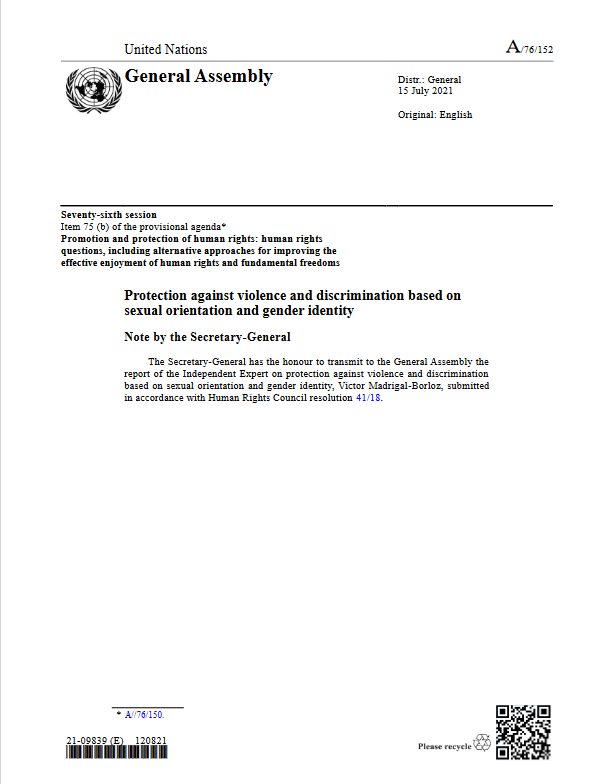2022 Report of the Independent Expert on SOGI: Practices of Exclusion
Analysis of precedential value
The independent Expert on protection against violence and discrimination based on sexual orientation and gender identity (also known as IE SOGI) is a human right expert mandated to report and advise on this human right. This mandate was created by the UN Human Rights Council in June 2016 to address concern at acts of violence and discrimination committed against individuals because of their sexual orientation or gender identity. It was most recently renewed by the Human Rights Council in June 2022. Victor Madrigal-Borloz is the mandate holder who issued this report. This report constitutes an authoritative source of expert precedent for the meaning and significance of key language.
Used as precedent
sex characteristics
“The biological reality of sex characteristics must not be conflated with the social construct of gender.” (paragraph 16)
reproductive rights, sexual rights
“Women are targets of discrimination and violence around the world, and the recognition of their sexual and reproductive rights–that is, their ability to take decisions in relation to their bodies and sexuality–is a prerequisite for ensuring their full enjoyment of rights.” (paragraph 20)
bodily autonomy and integrity
“Negation undermines bodily autonomy in respect of the ability of LGBT persons (and others) to access the benefits of family life.” (paragraph 22)
gender identity and expression
“There is also strong evidence of violence and discrimination based on gender identity because of narratives of exclusion under states of exception and in humanitarian and armed conflict.” (paragraph 28)
sexual orientation
“In Myanmar, United Nations investigators concluded that transgender people of Rohingya ethnicity were targeted by authorities with sexual violence, reportedly because of their gender and sexual orientation, and that the sexual violence against trans persons amounted to crimes against humanity of torture, rape, other inhumane acts and persecution as part of the widespread and systematic attack against the Rohingya civilian population.” (paragraph 29)
gender identity and expression, sexual orientation
“Anti-gender narratives create significant risk for the furtherance of the rights of women and can foster violence and discrimination based on sexual orientation and gender identity.” (paragraph 41)
“Gender identity and gender expression provide actual or perceived links to sexual orientation that are often at the origin of stigma and violence, a conclusion which many United Nations and regional human rights mechanisms have also reached.” (paragraph 50)
intersectionality
“Furthermore, although an intersectional approach acknowledges that individuals can hold multiple identities across different spectrums, it also acknowledges that a person’s experiences of these identities are interconnected.” (paragraph 50)
